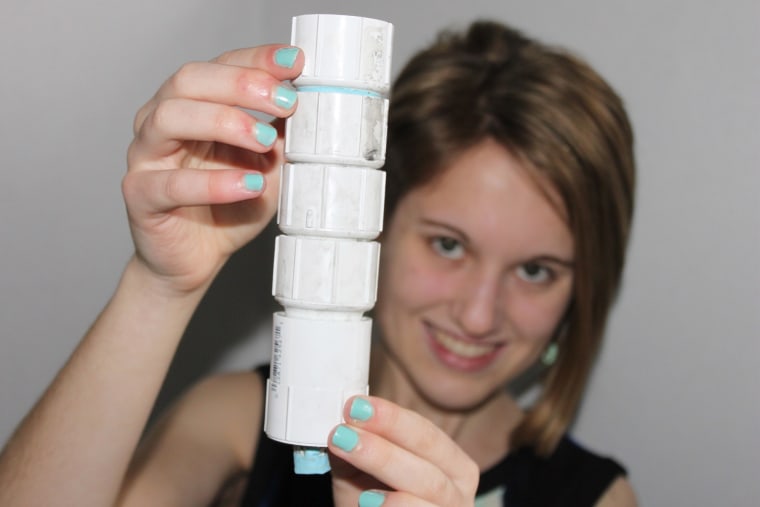A high-school senior has built a simple water filter using a common tree seed that can effectively remove bacteria such as E. coli and other pollutants. Distributing the easy-to-follow instructions on how to build the filter to developing countries could potentially save lives, she said.
“For people who are currently drinking contaminated water and don’t have access to another (filtration) method, I think this is really a step in the right direction,” Meghan Shea, an 18-year-old student at Unionville High School from West Chester, Penn., told NBC News.
Shea built a prototype of the filter for the Intel Science Talent Search, and was selected as one of 40 finalists convening March 7 through 12 in Washington, D.C. The annual competition identifies some of the nation’s most promising young scientists and innovators.
The finalists were narrowed down from 300 semifinalists and more than 1,700 entrants from around the country. Participants in the 72-year-old competition have gone on to win seven Nobel Prizes and 11 MacArthur Foundation Fellowships, among other honors.
Tree seed filter
Shea was inspired to build her filter after reading about the seeds from the Moringa oleifera tree, which release proteins when immersed in water that cause particles to clump together. The clumps, in turn, are easier for other filters such as charcoal and fabric to capture.
“They sounded like the perfect solution for water purification in areas without access to more sophisticated resources, because the tree happens to grow in a lot of regions where potable water is very scarce,” she said.
But, as she continued to read, she realized water filters based on the seeds had yet to become widely adopted. This was largely because the existing filters based on the seeds were “far too difficult for somebody in an impoverished region to be using.”
Her solution is a filter system made out PVC piping or any other material with interlocking segments, such as widely-available bamboo. Each segment contains a filter element — in her prototype, it's soil followed by charcoal followed by fabric.
The crushed seeds go in the top segment, which causes the pollutants to form large enough clumps for the other segments to capture, Shea explained. “It is essentially using materials that aren’t normally effective and coupling them with these seeds so they become effective,” she said.
Shea proved the effectiveness of the filter with discolored lake water and water she spiked with E. coli bacteria. It worked.
Give knowledge, not devices
There are highly-engineered filters on the market such as LifeStraw that are 99.99 percent effective at removing all pollutants, Shea acknowledges. She doubts her filter will ever be that good. Still, for people without access to higher-tech devices, she thinks her solution is “a great alternative.”
Shea aims to convince non-profit organizations currently building large-scale filtering devices in communities in need of potable water or distributing individual filters such as LifeStraw to distribute instructions on how to build her filter.
“Instead of bringing new devices,” she said, “they could be bringing knowledge and disseminating knowledge. And if they don’t already have the trees growing, they could be distributing seeds. That would be a lot cheaper than a lot of the devices currently being used.”
Shea herself is headed to college next fall where she aims to continue studying environmental sciences and pushing for her filter design to reach its full potential.
Her focus on environmental sciences is a shift from a childhood fascination with sea horses and determination from age four to pursue a career in marine biology, though Shea said she is keeping an open mind to the myriad possibilities of a career in the sciences.
“I love research,” she said. “So as long as I have a laboratory to work in and problems to solve, I know I’m going to be happy.”
John Roach is a contributing writer for NBC News. To learn more about him, check out his website.
